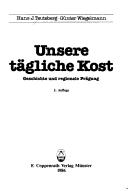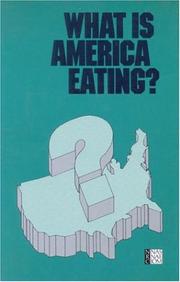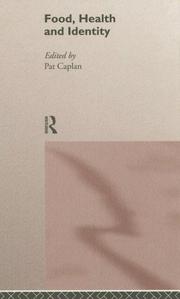| Listing 1 - 10 of 337 | << page >> |
Sort by
|
Book
ISBN: 1474262260 9781474262262 9781350070141 Year: 2018 Publisher: London
Abstract | Keywords | Export | Availability | Bookmark
 Loading...
Loading...Choose an application
- Reference Manager
- EndNote
- RefWorks (Direct export to RefWorks)
Food habits --- Eating --- Food customs --- Foodways --- Human beings --- Habit --- Manners and customs --- Diet --- Nutrition --- Oral habits

ISBN: 3885472791 Year: 1986 Publisher: Münster Coppenrath
Abstract | Keywords | Export | Availability | Bookmark
 Loading...
Loading...Choose an application
- Reference Manager
- EndNote
- RefWorks (Direct export to RefWorks)
Food habits --- -Eating --- Food customs --- Foodways --- Human beings --- Habit --- Manners and customs --- Diet --- Nutrition --- Oral habits --- History --- -History

ISBN: 0309036356 9786610222100 1280222107 0309564018 9780309564014 9780309036351 0309078563 9780309078566 Year: 1986 Publisher: Washington, D.C. National Academy Press
Abstract | Keywords | Export | Availability | Bookmark
 Loading...
Loading...Choose an application
- Reference Manager
- EndNote
- RefWorks (Direct export to RefWorks)
Explaining dietary habits, this volume examines the impact of fast-food proliferation and the changing role of women as it affects dietary behavior, and analyzes the nutritional consequences of national dietary trends. It focuses on the factors that shape eating patterns, eating trends such as snacking and food variety, nutrition policy, and more.
Diet --- Nutrition --- Food habits --- Eating --- Food customs --- Foodways --- Human beings --- Habit --- Manners and customs --- Oral habits --- Health --- Food

ISBN: 1134730004 1280050756 0203443799 0203276043 9780203276044 9780203443798 9786610050758 6610050759 9781134730001 9781134729951 1134729952 9781134729999 1134729995 9780415156806 0415156807 9780415156790 0415156793 9781280050756 Year: 1997 Publisher: London New York Routledge
Abstract | Keywords | Export | Availability | Bookmark
 Loading...
Loading...Choose an application
- Reference Manager
- EndNote
- RefWorks (Direct export to RefWorks)
By addressing the issue of food and eating in Britain today, this book considers the way in which our food habits are changing, and shows how social and personal identities and perceptions of health and risk influence choices.
Food habits --- Diet --- Health --- Food --- Nutrition --- Eating --- Food customs --- Foodways --- Human beings --- Habit --- Manners and customs --- Oral habits
Book
ISBN: 1317145992 1317145984 1409442640 9781409442646 9781409442639 1409442632 9781317145998 9781317145981 9781315578781 9781317145974 9781138634947 1138634948 1315578786 Year: 2014 Publisher: Farnham, England : Ashgate,
Abstract | Keywords | Export | Availability | Bookmark
 Loading...
Loading...Choose an application
- Reference Manager
- EndNote
- RefWorks (Direct export to RefWorks)
Bringing together cultural anthropologists, archaeologists, historians and other scholars of food and heritage, this volume closely examines the ways in which the cultivation, preparation, and consumption of food is used to create identity claims of 'cultural heritage' on local, regional, national and international scales. Featuring case studies from Europe, Asia and the Americas, this timely volume also addresses the complex processes of classifying, designating, and valorizing food as 'terror,' 'slow food,' or as intangible cultural heritage through UNESCO. By effectively analyzing food and
Food habits. --- Eating --- Food customs --- Foodways --- Human beings --- Habit --- Manners and customs --- Diet --- Nutrition --- Oral habits --- Food habits
Book

ISBN: 1782385630 1322950776 9781322950778 9781782385639 9781782385622 Year: 2015 Publisher: New York Oxford
Abstract | Keywords | Export | Availability | Bookmark
 Loading...
Loading...Choose an application
- Reference Manager
- EndNote
- RefWorks (Direct export to RefWorks)
Foods are changed not only by those who produce and supply them, but also by those who consume them. Analyzing food without considering changes over time and across space is less meaningful than analyzing it in a global context where tastes, lifestyles, and imaginations cross boundaries and blend with each other, challenging the idea of authenticity. A dish that originated in Beijing and is recreated in New York is not necessarily the same, because although authenticity is often claimed, the form, ingredients, or taste may have changed. The contributors of this volume have expanded the discus
Food habits --- Diet --- Health --- Food --- Nutrition --- Eating --- Food customs --- Foodways --- Human beings --- Habit --- Manners and customs --- Oral habits
Book
ISBN: 9781608764396 1608764397 9781604568646 160456864X Year: 2009 Publisher: New York Nova Science Publishers
Abstract | Keywords | Export | Availability | Bookmark
 Loading...
Loading...Choose an application
- Reference Manager
- EndNote
- RefWorks (Direct export to RefWorks)
Food habits --- Diet. --- Health --- Food --- Nutrition --- Eating --- Food customs --- Foodways --- Human beings --- Habit --- Manners and customs --- Diet --- Oral habits --- Research.
Book
ISBN: 0262366541 9780262366540 9780262542913 0262542919 0262366533 Year: 2021 Publisher: Cambridge, Massachusetts : The MIT Press
Abstract | Keywords | Export | Availability | Bookmark
 Loading...
Loading...Choose an application
- Reference Manager
- EndNote
- RefWorks (Direct export to RefWorks)
"The stories in this collection open a window onto those new categories in the making. Taken together, they call for new approaches to the history of global food, and using this history to think about our future"--
Food --- Food habits --- History. --- Food habits. --- Eating --- Food customs --- Foodways --- Human beings --- Habit --- Manners and customs --- Diet --- Nutrition --- Oral habits
Book
ISBN: 9892608860 9892608852 Year: 2014 Publisher: Coimbra University Press
Abstract | Keywords | Export | Availability | Bookmark
 Loading...
Loading...Choose an application
- Reference Manager
- EndNote
- RefWorks (Direct export to RefWorks)
They were received and adapted in the Brazilian culture. The work is organized in four parts, each one with several chapters, approaching food heritage from Classical Antiquity to the present. Part I concerns eating practices and hospitality in the Greek and Roman worlds, the two great civilization founders of Europe. The main goal of its chapters is to demonstrate that some contemporary food habits are very strongly connected to a Classical Mediterranean heritage. The underlining of these cultural bounds between nowadays food culture and its past allows us to understand the real importance of food on the shaping of everybody’s cultural identity. Part II focus on food in the Middle Ages, particularly on its moral and religious issues. The social contexts considered are the king’s table and the monastic communities, because those are the most well documented realities we have. Part III discusses the transition from the Middle Ages to the Modern Era, taking as example, once again, the food habits of the royal family and also of a university college. With the Portuguese Discoveries came a great impulse on sugar production and, consequently, on the manufacturing, commerce and consumption of sweets, a thematic central on this part. Part IV is dedicated to the contribution of Portuguese heritage in structuring a discourse on Brazilian cuisine and to the early appearance on the Brazilian colonial society of myths, beliefs, and taboos concerning breastfeeding (a field of research usually marginal on Food History).
Portuguese --- Food habits --- History. --- Eating --- Food customs --- Foodways --- Human beings --- Habit --- Manners and customs --- Diet --- Nutrition --- Oral habits
Book
ISBN: 1803270934 1803270926 Year: 2021 Publisher: Oxford : Archaeopress Publishing,
Abstract | Keywords | Export | Availability | Bookmark
 Loading...
Loading...Choose an application
- Reference Manager
- EndNote
- RefWorks (Direct export to RefWorks)
Plant Food Processing Tools at Early Neolithic Göbekli Tepe reconstructs plant food processing at this key Pre-Pottery Neolithic (9600-8000 BC) site, with an emphasis on cereals, legumes and herbs as food sources, on grinding and pounding tools for their processing, and on the vessels implied in the consumption of meals and beverages. Functional investigations on grinding and pounding tools and on stone containers through use-wear and residue analyses are at the core of the book. Their corpus amounts to more than 7000 objects, constituting thus the largest collection published so far from the Neolithic of Upper Mesopotamia. The spectrum of tools and of processed plants is very broad, but porridges made of cereals, legumes and herbs, and beers predominate over bread-like food. The find contexts show that cooking took place around the well-known monumental buildings, while the large quantity of tools suggests feasting in addition to daily meals.
Food habits. --- Food habits --- Eating --- Food customs --- Foodways --- Human beings --- Habit --- Manners and customs --- Diet --- Nutrition --- Oral habits
| Listing 1 - 10 of 337 | << page >> |
Sort by
|

 Search
Search Feedback
Feedback About UniCat
About UniCat  Help
Help News
News